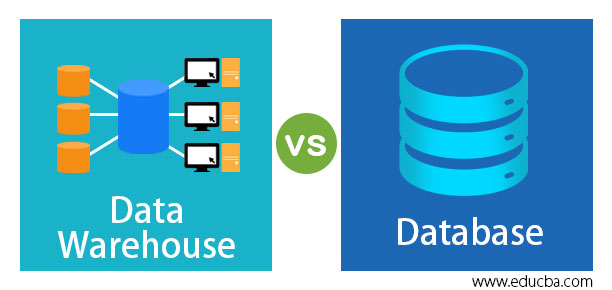Updated March 18, 2023

Difference Between Data Warehouse and Database
Data Warehouse is used to archive the data, whereas a database holds current data and related Transactions. The data in Datawarehouse can be used for Analytical and Reporting purposes. Hence it comes under OLAP (Online Analytical Processing), while the data in a database can be used for Transactional purposes. Hence it comes under OLTP (Online Transaction Processing). Both the systems are capable of storing Relational data, although Data Warehouse can accommodate both relational and multidimensional data.
Head to Head Comparison Data Warehouse and Database Infographics
Below is the top 6 difference between Data Warehouse vs Database :

Key differences
Below are the key differences:
- The database is based on OLTP, and the data warehouse is based on OLAP,
- The database is primarily focused on current data, and the normalization process reduces the historical content. However, the data warehouse uses historical data to determine insights on business intelligence.
- The database is time-variant in nature and only deals with current data. However, the concept of data analytics using historical data makes the corporate decision-making process easier by providing the trends and behavior of the historical data.
- The data warehouse compares the reporting and analysis and is designed to store data available from different data sources. However, the database is based on carrying out dynamic data transaction processing.
Head to Head comparison (Table Format)
Below is the comparison:
| Data Warehouse | Database |
| A Data warehouse uses OLAP( Online Analytical Processing) and thus is able to attend to only a small limited complex query at one time. | A database uses OLTP (Online Transaction processing ) to perform CRUD(Create, Read, Update, Delete) operations to optimize the database system’s data processing efficiency and transactional speed. |
| Data Warehouse also performs fast query processing; however, the number of queries per transaction is smaller to database transactional capacity. Further, as part of its business intelligence capabilities, the data warehouse systems are able to provide summarized insights on trends of data. | The database can be used to perform fast query processing, allows multi-access to the single data source, and has high transactional efficiency. |
| Data Warehouse uses denormalized data structures as it is beneficial for analytical operations on data. | The database uses a Normalized data structure with provisions to reduce redundant data and groups of organized data on the basis of the attributes. |
| Time-invariant as data warehousing uses historical data to provide analytical trends and hence has to record both currents and historical data to determine the same. | Time-variant: – Database is time-variant in nature as they are typically free from historical data. The historical data is considered as a redundancy scope in Normalization, and hence the same is removed post successive commits on the data queries. |
| The data warehouse technique is based on OLAP technology and hence is based on complex queries for data analysis. These complex queries are impacting system performance on the basis of the number of transactions being carried out in the system. | Concurrent user access is the biggest advantage of the database, as the OLTP model for data analytics provides scope for a large number of concurrent users to carry on the data processing and operations at the same time without impacting the system performance. |
| There are one too many relationships among the data fields in the data warehouse. | There is only one to one relationship between the entity fields; the tables are normalized to provide redundancy free and efficient data. |
Conclusion
Data warehouse vs database uses a table-based structure to manage the data and use SQL queries for carrying out the same. However, the purpose of both is entirely different as a data warehouse is used in influencing business decisions; however, the database is used for online transactional processing and data operations. Also, the data type considered is different in both the cases as the database uses current data for its operations; however, the data warehouse is based to generally use historical trends in data.
Recommended Articles
This has been a guide to the top difference between Data Warehouse vs Database. Here we also discuss the key differences with infographics and comparison table. You may also have a look at the following articles to learn more.

